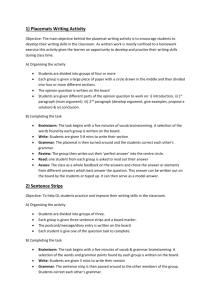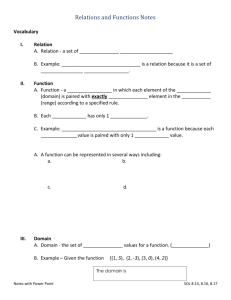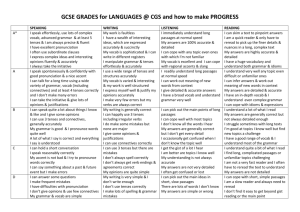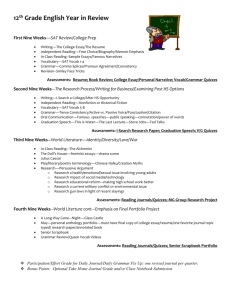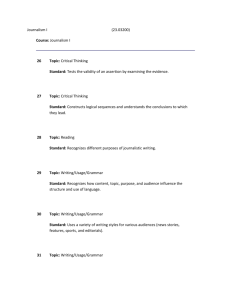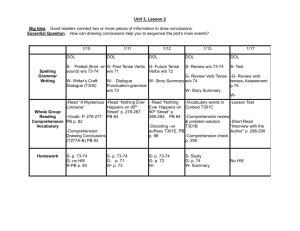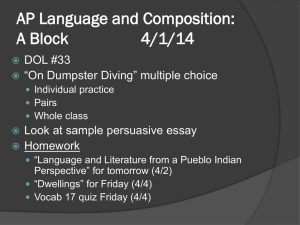Fluency Reading, Station 2: Grammar - worksheets
advertisement
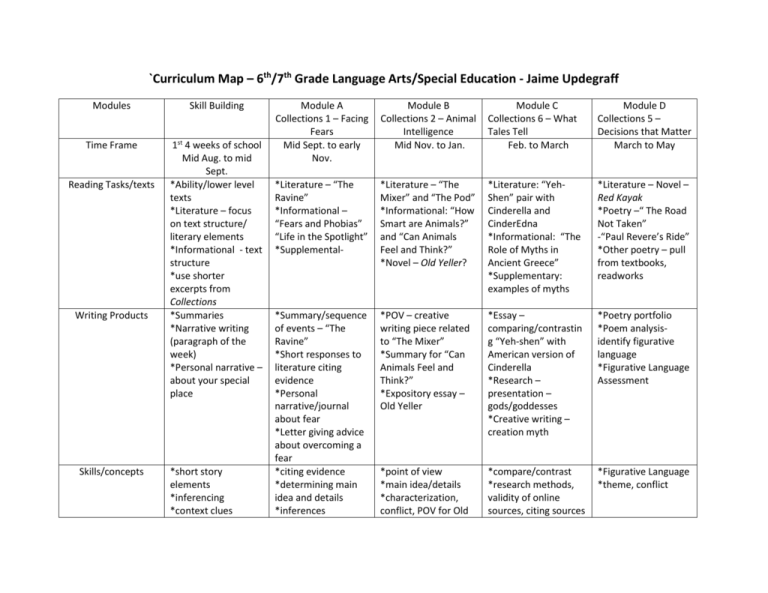
`Curriculum Map – 6th/7th Grade Language Arts/Special Education - Jaime Updegraff Modules Skill Building Time Frame 1st 4 weeks of school Mid Aug. to mid Sept. *Ability/lower level texts *Literature – focus on text structure/ literary elements *Informational - text structure *use shorter excerpts from Collections *Summaries *Narrative writing (paragraph of the week) *Personal narrative – about your special place Reading Tasks/texts Writing Products Skills/concepts *short story elements *inferencing *context clues Module A Collections 1 – Facing Fears Mid Sept. to early Nov. Module B Collections 2 – Animal Intelligence Mid Nov. to Jan. Module C Collections 6 – What Tales Tell Feb. to March Module D Collections 5 – Decisions that Matter March to May *Literature – “The Ravine” *Informational – “Fears and Phobias” “Life in the Spotlight” *Supplemental- *Literature – “The Mixer” and “The Pod” *Informational: “How Smart are Animals?” and “Can Animals Feel and Think?” *Novel – Old Yeller? *Literature: “YehShen” pair with Cinderella and CinderEdna *Informational: “The Role of Myths in Ancient Greece” *Supplementary: examples of myths *Literature – Novel – Red Kayak *Poetry –“ The Road Not Taken” -“Paul Revere’s Ride” *Other poetry – pull from textbooks, readworks *Summary/sequence of events – “The Ravine” *Short responses to literature citing evidence *Personal narrative/journal about fear *Letter giving advice about overcoming a fear *citing evidence *determining main idea and details *inferences *POV – creative writing piece related to “The Mixer” *Summary for “Can Animals Feel and Think?” *Expository essay – Old Yeller *Essay – comparing/contrastin g “Yeh-shen” with American version of Cinderella *Research – presentation – gods/goddesses *Creative writing – creation myth *Poetry portfolio *Poem analysisidentify figurative language *Figurative Language Assessment *point of view *main idea/details *characterization, conflict, POV for Old *compare/contrast *research methods, validity of online sources, citing sources *Figurative Language *theme, conflict Instructional Resources Grammar *resources: worksheets found online, Schmoop videos, School House Rock videos, task cards, word sorts, multisensory activities found on Pinterest , Kahoot quizzes Instructional Strategies *main idea/details *story elements Yeller *Thinking Maps *Main Idea Task Cards *Inference Task Cards *Vocab charts *Interactive notebook *Paired passages *Differentiated passages *Parts of speech -nouns -pronouns -verbs *Thinking maps for characterization and sequencing *lit books for supplementary texts *Wild Side passages *POV – interactive notebook, Google presentation, worksheets *Novel – Old Yeller *Thinking Maps *Task cards *Thinking Maps for compare/contrast *Supplementary texts – lit books, myths written at lower lexile levels *Task cards *Interactive notebook materials *Supplementary poems from lit books, readworks *Task cards *Parts of Speech -adjectives -adverbs -prepositions -conjunctions *Subjects/predicates *sentences/fragment s *Capitalization *Punctuation endmarks *Punctuationcommas *Revising/combining sentences *Close Reads – annotating the text *Flexible Grouping *Read alouds *Highlighting with a purpose *”I do, We do, You do” *Close Reads – annotating the text *Flexible Grouping *Read alouds *Highlighting with a purpose *”I do, We do, You do” *Close Reads – annotating the text *Flexible Grouping *Read alouds *Highlighting with a purpose *”I do, We do, You do” *Close Reads – annotating the text *Flexible Grouping *Read alouds *Highlighting with a purpose *”I do, We do, You do” *Close Reads – annotating the text *Flexible Grouping *Read alouds *Highlighting with a purpose *”I do, We do, You do” Interventions/Skills Building Accommodations *Words Their Way *DOL *Fluency Reading *Moby Max *Lexia *Independent reading packets – paired passages *Vocab – Latin prefixes/roots *provide sentence frames *outline of notes for grammar *outlines for summaries and narrative writing piece *Words Their Way *DOL *Fluency Reading *Moby Max *Lexia *Independent reading packets – paired passages *Vocab – Latin prefixes/roots *provide sentence frames *outline of notes for grammar *outlines for writing pieces * *Words Their Way *DOL *Fluency Reading *Moby Max *Lexia *Independent reading packets – paired passages *Vocab – Latin prefixes/roots *provide sentence frames *outline of notes for grammar *outlines for writing pieces *reduce # of quotes/evidence for essay *Words Their Way *DOL *Fluency Reading *Moby Max *Lexia *Independent reading packets – paired passages *Vocab – Latin prefixes/roots *provide sentence frames *outline of notes for grammar *outlines for writing pieces *reduce amount/number of resources for research *Words Their Way *DOL *Fluency Reading *Moby Max *Lexia *Independent reading packets – paired passages *Vocab – Latin prefixes/roots provide sentence frames *outline of notes for grammar *outlines for writing pieces *reduce number of poems in poetry portfolio *Suggested Daily Schedule for a 90-minute period: 1) Daily Warm-up (5-10 mintues)–DOL (Daily Oral Language sentences), Brief Grammar Lesson -introducing the concept to be worked on that day 2) Learning Stations (15 minutes each- 45 minutes total) - Students are broken into small groups. This is designed to support students with interventions tailored to their individual levels. -Station 1: Fluency Reading, Station 2: Grammar - worksheets/Moby Max, Station 3: Words Their Way 3) Direct/Whole Group Instruction/Reading/Writing(40-45 minutes) – Depending on the text we are planning to read, I might work with students on building academic vocabulary with notes/examples, frontloading story vocabulary, building necessary background knowledge, and explicitly teaching skills like making inferences, using context clues, etc. We will read the designated text with paired writing activities – This could look different every day. I typically read the text aloud with students, then I present them with group or individual work for the day. Or, one day we may spend the whole time reading, then the next day we follow up with writing. We will also frequently use the audio feature in Collections.
